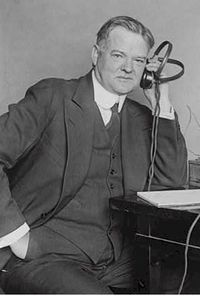Think of this as Volume 16, Number 30 of A-Clue.com, the online newsletter I've written since 1997. Enjoy.

Why did the Crash of 1929 result in a recession so severe that the President who dithered over it wound up calling it just “a little depression” – hence the term Great Depression?
None other than Herbert Hoover.
Hoover was not a bad man, nor a stupid man. He may have been one of our brightest Presidents. And until 1929 he was widely celebrated for his work against starvation in Europe after World War I, and the destruction of Louisiana in 1927.
But in the face of collapsing asset values he dithered. He represented creditors, who expected debtors to pay their debts. The fact that the debtors were bankrupt mattered nothing. Liquidate them.
Hoover made several half-hearted efforts to ameliorate the situation. It was the Hoover Administration that created the Reconstruction Finance Corp. But he would go so far and no further, and he would go nowhere fast. First, do no harm he said.
First, do something said his opponent. Franklin Roosevelt. America believed that. FDR was not an ideologue. He was a progressive like Hoover. But he was willing to experiment, to try things, and to discard what didn't work, then try again. Mainly, he was willing to use inflation, to cut the value of the creditors' debts, to allow them to be paid in higher-priced goods. And it worked. U.S. economic growth during the first Roosevelt Administration averaged almost 10%.
So who is Herbert Hoover now?
Merkel's biography is as inspiring in her way as Hoover's was. She was born in what was then East Germany. She became involved in politics only after the wall fell, and rose to power as a unifying force, just as Hoover rose to power as a humanizing one.
She's a good person. She's a smart person. But in refusing to challenge the dominant ideology of her country, in her time, she is dithering, and making a bad situation worse.
Germany's economy is as central to Europe, and the world, as ours was in 1932. Merkel has spent the last several years doing as little as possible to ameliorate the suffering in Greece, in Italy and elsewhere. Her nationalism will not allow the financial integration necessary to make the Euro work. Her ties to creditors won't let her unleash the inflation that would get the economy moving again.
This is at the heart of our present economic crisis. Without Europe, our growth is slowing. Even China's growth is slowing. The stimulus both countries have put in place just goes into a deep, dark hole, sucked up by creditors demanding debts be paid before the money gets used.
What's obviously needed now is relief from debts, write-offs to creditors, and the printing of more money, the creation of inflation, so debts can be repaid in goods whose prices are rising rather than falling.
The irony, of course, is that America's Hoover-ites are using the dithering of Germany's Hoover-ettes to try and seize back the power they lost because of their own cupidity four years ago. It was the Republican policies of George W. Bush, the ideological policies born in the wreckage of that Depression, in the failed theories of Ludwig Von Mises, that drove America over the cliff. And now his followers seek to use anothers' failures to take power back for themselves.
Germany's next election won't happen until next fall. It's time for them to find their Roosevelt, for their sake and the sake of the whole world. Not an ideologue, but someone who will try things, and when they fail try something else.
We've had enough of ideologues.











